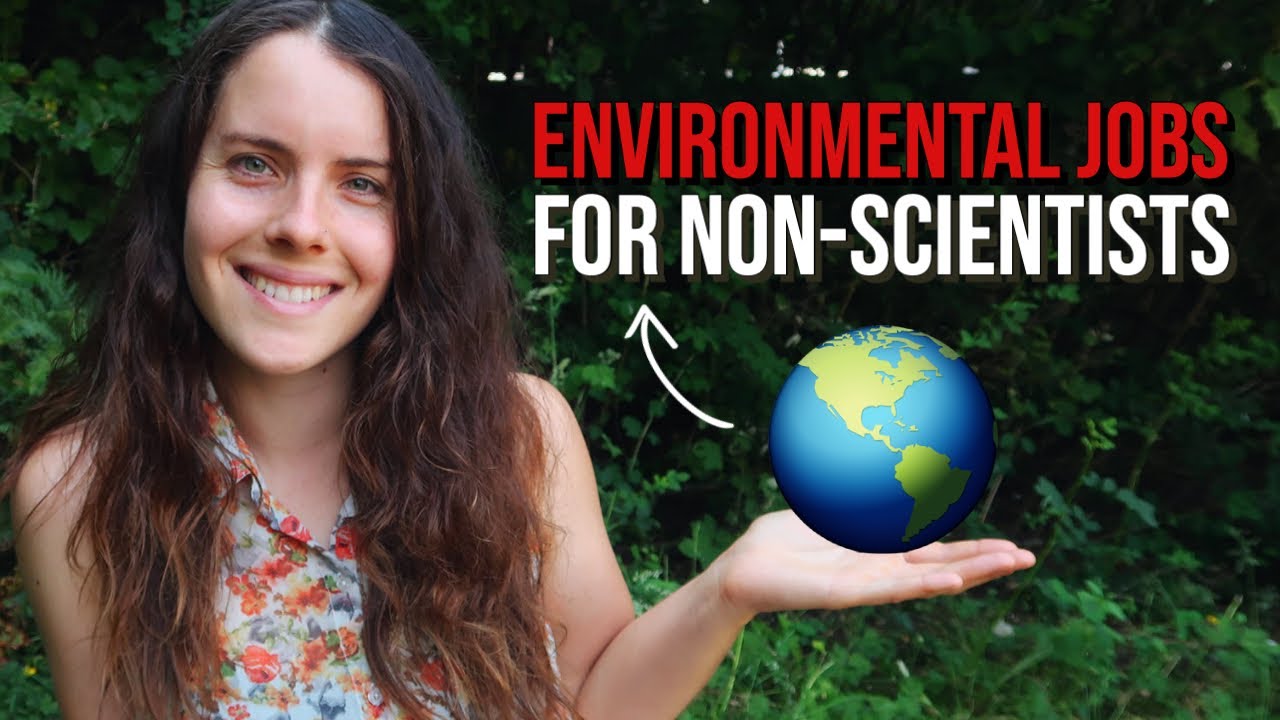In today's world, environmental concerns have become increasingly critical, prompting individuals to seek careerpaths that contribute to a sustainable future. The field of environmental services has emerged as a promising career choice for those who are passionate about addressing environmental challenges.
In this article, we will explore whether is environmental services a good career path. With a focus on making a positive impact, a diverse range of career opportunities, job growth, competitive salaries, innovation, and collaboration, environmental services offer a fulfilling and rewarding path for individuals seeking to protect and preserve our planet.
Why Choose A Career In Environmental Services?

Environmental Services - See Yourself in Healthcare
Choosing a career in environmental services offers a range of compelling reasons. Here are some key factors that make it an attractive career choice:
- Making a Positive Impact -Environmental services professionals have the opportunity to make a significant and tangible difference in the world. By addressing pressing environmental issues such as climate change, pollution, and resource depletion, they contribute directly to the preservation and sustainability of our planet.
- Fulfilling and Meaningful Work -Many individuals are drawn to environmental services because it provides work that aligns with their personal values and passions. The sense of purpose that comes from actively working toward environmental protection and sustainability can lead to a high level of job satisfaction and fulfillment.
- Diverse Career Opportunities - The field of environmental services offers a wide range of career paths, allowing individuals to explore various areas of interest. Whether it's in environmental consulting, renewable energy, conservation, waste management, policy development, or research, there are numerous opportunities to specialize and find a niche that matches one's skills and interests.
- Job Growth and Stability -As awareness of environmental issues grows, so does the demand for environmental services professionals. Governments, businesses, and organizations worldwide are increasingly prioritizing sustainability and environmental stewardship, leading to a steady demand for qualified individuals in this field. This trend provides job stability and a positive outlook for career growth.
- Innovation and Advancement -Environmental service is a dynamic field that continuously evolves as new technologies, practices, and solutions emerge. Professionals in this field have the opportunity to contribute to innovative approaches to environmental challenges. Whether it's implementing renewable energy systems, developing sustainable policies, or utilizing cutting-edge technologies, the field offers room for creativity, problem-solving, and professional growth.
- Collaboration and Networking -Environmental services often involve collaboration with various stakeholders, such as government agencies, businesses, non-profit organizations, and local communities. This collaborative environment provides opportunities for networking, knowledge-sharing, and building connections with like-minded individuals, fostering personal and professional growth.
A career in environmental services offers the chance to make a positive impact, meaningful work, diverse opportunities, job stability, innovation, and collaboration. It is a field that attracts individuals who are passionate about the environment and are committed to creating a sustainable future for generations to come.
Education And Certification Requirements For A Career In Environmental Services
Education and certification requirements for a career in environmental services can vary depending on the specific role and industry. Here are some general guidelines:
Education
- Bachelor's Degree- Many entry-level positions in environmental services require a minimum of a bachelor's degree in a related field. Common undergraduate majors include environmental science, environmental studies, ecology, biology, chemistry, geology, or engineering. These programs provide a solid foundation in environmental principles, scientific methods, data analysis, and relevant coursework.
- Master's Degree- For more specialized or advanced positions, such as research or management roles, a master's degree in a relevant field can be beneficial. A master's degree allows for deeper knowledge and expertise in specific areas of environmental services.
Certifications
- Environmental Professional Certifications- Various professional certifications can enhance career prospects and demonstrate expertise in specific areas of environmental services. For example, the Certified Environmental Professional (CEP) designation is offered by the Academy of Board Certified Environmental Professionals (ABCEP). Other certifications include Certified Hazardous Materials Manager (CHMM), Certified Environmental Scientist (CES), and Certified Environmental and Safety Compliance Officer (CESCO).
- Geographic Information Systems (GIS) Certification- Proficiency in GIS is valuable in many environmental services roles. Obtaining a GIS certification can provide a competitive edge and demonstrate proficiency in mapping and spatial analysis, which are essential skills in environmental assessment, planning, and resource management.
- Leadershipand Management Certifications- As professionals progress in their careers, certifications in leadership and management can be beneficial for assuming supervisory or managerial roles. These certifications focus on skills such as project management, team leadership, and strategic planning.
What Do People Working In Environmental Services Do?

Realistic Job Preview - Environmental Services
People working in environmental services perform a wide range of tasks and responsibilities depending on their specific roles and areas of expertise. Here are some common activities and functions performed by professionals in environmental services:
- Environmental Assessments -Environmental professionals conduct assessments to evaluate the impact of human activities on the environment. They analyze and document factors such as air quality, water quality, soil conditions, biodiversity, and ecological systems to identify potential environmental risks and develop mitigation strategies.
- Environmental Monitoring and Sampling -Environmental services professionals collect samples of air, water, soil, or biological materials to assess pollution levels, contaminants, and the overall health of ecosystems. They use various monitoring techniques, instruments, and laboratory analysis to gather data and make informed decisions regarding environmental management.
- Environmental Compliance and Regulation -Professionals in environmental services ensure that individuals, organizations, and industries comply with environmental regulations and standards. They assist in the development and implementation of environmental policies, review permits, conduct audits, and provide guidance on compliance measures to minimize environmental impact.
- Environmental Planning and Management -Environmental services professionals play a crucial role in developing and implementing environmental management plans. They assess the feasibility and impact of proposed projects and develop strategies for sustainable land use, water resource management, waste management, and conservation efforts. They also provide recommendations for environmental best practices and assist in the integration of environmental considerations into development plans.
- Sustainable Resource Management -Environmental professionals focus on managing natural resources in a sustainable manner. They work on projects related to renewable energy, waste reduction, recycling initiatives, sustainable agriculture, and water conservation. Their goal is to optimize resource use while minimizing environmental impact and promoting long-term sustainability.
- Environmental Education and Outreach -Some professionals in environmental services engage in educational activities and outreach programs to raise awareness and promote environmental stewardship. They may conduct workshops, seminars, or public campaigns to educate individuals, communities, and businesses about environmental issues, conservation practices, and sustainable lifestyles.
- Environmental Consulting -Environmental consultants provide expertise and advice to organizations, governments, or businesses on environmental matters. They conduct environmental impact assessments, advise on regulatory compliance, develop sustainability strategies, and offer guidance on green technologies and practices.
These are just a few examples of the tasks and roles within environmental services. The field is diverse and continually evolving, with professionals contributing to research, policy development, advocacy, and technological advancements aimed at preserving and protecting the environment.
10 Best Paying Jobs In Environmental Services

10 Environmental science careers you should know about (& salaries!)
The environmental services field offers various lucrative career options. While salaries can vary based on factors such as location, experience, and industry, here are ten well-paying jobs in environmental services:
- Environmental Engineer- Environmental engineers design and implement solutions to address environmental issues. They earn a median annual wage of around $92,120 in the United States, according to the U.S. Bureau of Labor Statistics.
- Environmental Lawyer - Environmental lawyers specialize in environmental law and handle legal matters related to environmental regulations and sustainability. Their salaries can range from $80,000 to $150,000 or more, depending on experience and location.
- Environmental Health and Safety (EHS) Manager- EHS managers ensure organizations comply with environmental regulations and develop safety protocols. Their median annual salary is around $89,130 in the United States.
- Environmental Consultant- Environmental consultants provide expertise and advice on environmental issues to organizations. Their salaries can vary widely but often range from $60,000 to $100,000 or more, depending on experience and specialization.
- Environmental Scientist- Environmental scientists conduct research and analyze data to assess environmental impact and develop mitigation strategies. They earn a median annual wage of approximately $73,230 in the United States.
- Renewable Energy Manager- Renewable energy managers oversee the development and implementation of renewable energy projects. Salaries in this role can range from $70,000 to over $100,000, depending on the organization and project scale.
- Sustainability Manager- Sustainability managers work to integrate sustainable practices and initiatives into organizations. Their salaries can range from $70,000 to $120,000 or more, depending on the size and industry of the organization.
- Environmental Policy Analyst- Environmental policy analysts assess and analyze environmental policies and their impact. Their salaries can vary, but experienced professionals in this role can earn between $70,000 and $100,000 or more.
- Environmental Remediation Manager- Environmental remediation managers oversee the cleanup and restoration of contaminated sites. Their salaries can range from $70,000 to over $100,000, depending on the scope and complexity of the projects.
- Environmental Project Manager- Environmental project managers coordinate and manage environmental projects, ensuring successful execution and meeting environmental objectives. Salaries for this role can range from $70,000 to $100,000 or more, depending on experience and project size.
Entry-Level Jobs In Environmental Services

12 Environmental career paths for non-scientists
Entry-level positions in environmental services provide individuals with a valuable starting point to launch their careers in the field. Here are some common entry-level jobs in environmental services:
- Environmental Technician- Environmental technicians assist with fieldwork, data collection, and laboratory analysis. They may perform tasks such as water and soil sampling, monitoring air quality, conducting biodiversity surveys, and assisting in environmental assessments.
- Environmental Field Assistant- Field assistants support environmental scientists and professionals in conducting research and data collection activities. They assist with fieldwork, sample collection, equipment setup, and data recording.
- Environmental Analyst- Environmental analysts assist in analyzing environmental data, conducting research, and preparing reports. They may work with environmental monitoring data, help identify trends, and contribute to data interpretation.
- Environmental Compliance Assistant- Compliance assistants support the compliance team in ensuring that organizations meet environmental regulations and standards. They assist in conducting audits, reviewing permits, and documenting compliance activities.
- Environmental Educator- Environmental educators develop and deliver educational programs on environmental topics. They may work in schools, nature centers, or environmental organizations, providing lessons and workshops to raise awareness and promote sustainable practices.
- Sustainability Coordinator- Sustainability coordinators support sustainability initiatives within organizations. They assist in implementing green practices, managing recycling programs, analyzing energy consumption, and promoting sustainable behavior among employees.
- Environmental Planner- Entry-level environmental planners assist in the development of environmental plans and policies. They contribute to research, data analysis, and public engagement efforts to ensure the integration of environmental considerations into planning processes.
- Environmental Laboratory Technician- Laboratory technicians work in environmental testing laboratories, assisting with sample processing, analysis, and quality control procedures. They may perform tests on air, water, soil, or other environmental samples.
- Environmental Project Assistant- Project assistants provide administrative and logistical support for environmental projects. They help with project coordination, document management, scheduling, and communication with stakeholders.
- Environmental Health and Safety (EHS) Coordinator- EHS coordinators assist with the implementation of health and safety programs in compliance with environmental regulations. They support risk assessments, safety training, and incident reporting.
People Also Ask
What Is Meant By Environmental Services?
Environmental services refer to a broad range of activities and practices aimed at protecting, managing, and improving the environment. This includes tasks such as environmental consulting, pollution control, waste management, conservation efforts, and sustainable resource management.
What Qualifications Do You Need For Environmental Services Jobs?
The qualifications required for environmental services jobs can vary depending on the specific role. Generally, a bachelor's degree in a related field such as environmental science, ecology, environmental engineering, or sustainability is often required. Some positions may require advanced degrees or specialized certifications.
What Is The Job Outlook For Environmental Services?
The job outlook for environmental services is generally positive. With the increasing global focus on environmental issues, there is a growing demand for qualified professionals in this field. Government initiatives, corporate sustainability goals, and environmental regulations contribute to job growth and provide opportunities for individuals pursuing careers in environmental services.
Conclusion
In a world grappling with environmental challenges, pursuing a career in environmental services can be an incredibly rewarding and impactful choice. Environmental professionals have the chance to make a tangible difference, working towards a sustainable future and preserving our planet for generations to come.
With a multitude of career opportunities, the potential for growth and innovation, competitive salaries, and the satisfaction of knowing that their work directly contributes to positive change, individuals embarking on a career in environmental services can find fulfillment and purpose in their professional lives. By dedicating their skills and passion to this field, they can be part of a collective effort to create a healthier and more sustainable world.